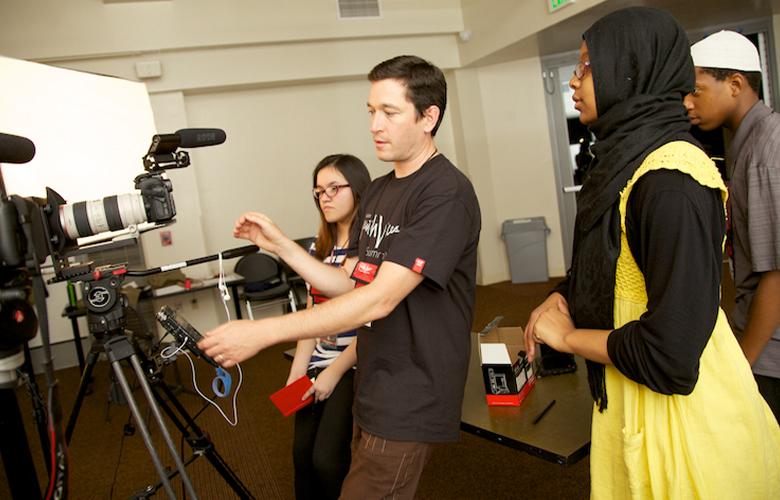
National Media Literacy Week kicks off on October 21 this year—at a time when media literacy education is more urgent than ever. In our digital society, critically evaluating media is vital to meaningful participation in democratic institutions. When you support young people in thoughtful, creative media making, you build media literacy skills and promote community engagement. These are powerful learning experiences with great civic value.
Media literacy is about raising the stakes—motivating consumers of media to care about the messages they’re seeing or hearing, to learn how to decode these messages, and to share their own views. When educators facilitate purposeful youth media making, students make deliberate choices about what to say and how to say it. Moving through this creative process behind the scenes as filmmakers, artists, or journalists gives them insight on the producers streaming content onto their phones and into their lives.
Youth media making
- Cultivates young people’s skills in analyzing and critiquing media
- Fosters creative idea development on the issues they care about
- Empowers youth to use technology to create and share compelling work with an audience they want to reach
For over 15 years, our EDC team, comprising Tony Streit (board president of the National Association for Media Literacy Education), Wendy Rivenburgh, and Kate Goddard, has delivered professional development in youth media education, changing how young people view media, their world, and themselves. We’ve trained over 5,000 educators in 60 countries through Adobe Youth Voices, YouthLearn, and other initiatives. And, we’ve learned that with the right supports, educators anywhere can facilitate meaningful activities that promote media literacy and empower youth to create media with purpose.
For educators looking to lead this work in their own programs, here are some strategies to try:
- Practice making media yourself, outside the classroom
- Seek examples of media bias and discuss with students
- Contemplate your own biases
- Explore the latest research on media literacy
- Use scaffolding activities to weave media literacy into your curriculum
- Pursue inquiry-based learning experiences
- Network with peers for reflection and moral support
It is possible to transform young people’s relationship with media and equip them to perceive the world differently. With educator support, they can evolve from passive consumers into informed change agents with their own messages to share.
What are your own experiences with engaging youth in media literacy and media making? Please share your ideas and insights below.
Wendy Rivenburgh, senior associate at EDC, designs programs to catalyze youth civic engagement through robust project-based learning experiences, media literacy education, and creative media making.
Kate Goddard, associate project director at EDC, puts youth development at the center of her work, designing and supporting programs that elevate inquiry and creativity as a tool of youth empowerment.
Add new comment